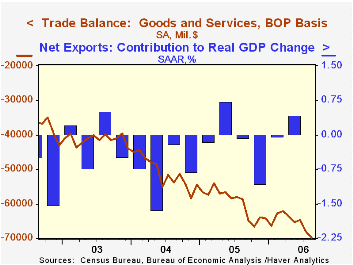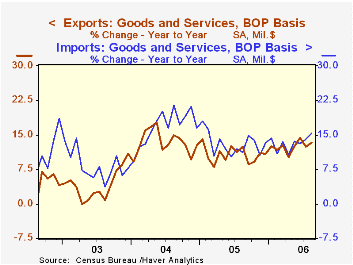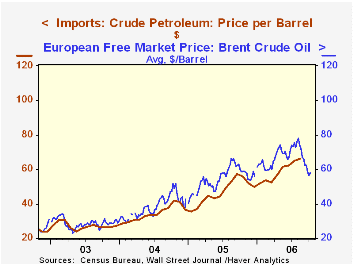 Global| Oct 12 2006
Global| Oct 12 2006Record August U.S. Trade Deficit Swelled By Higher Oil Prices
by:Tom Moeller
|in:Economy in Brief
Summary
The U.S. foreign trade deficit surged to another record in August of $69.9B versus an unrevised $68.0B in July. The figure was materially deeper than Consensus expectations for a shallower deficit of $66.8B. A rise in the per barrel [...]

The U.S. foreign trade deficit surged to another record in August of $69.9B versus an unrevised $68.0B in July. The figure was materially deeper than Consensus expectations for a shallower deficit of $66.8B.
A rise in the per barrel cost of imported crude oil to $66.12 (+25.1% y/y) in August ran counter to the forty cent m/m decline in the price of Brent Crude to $73.40. Brent crude then fell eleven dollars per barrel in September and the price of oil in October is down another five dollars to $57 per bbl. The rise in oil prices lifted the value of energy-related petroleum products by 7.2% m/m (29.6% y/y). The quantity of petroleum product imports rose 6.3% m/m (4.0% y/y).
Overall imports of goods & services jumped 2.4% m/m during August, however, the rise in petroleum imports wasn't the only source of strength. Imports of nonpetroleum products rose 2.7% (13.4% y/y) as imports of capital goods increased 2.7% (14.2% y/y) and nonauto consumer goods imports rose 1.8% (12.4% y/y). Automotive imports also posted a firm 2.5% (5.7% y/y) gain while imports of foods, feeds & beverages jumped another 3.4% (12.9% y/y).
Total exports rose 2.3% in August and recovered a little revised 1.3% July drop. The turnaround came as capital goods exports jumped 3.8% (12.4% y/y), led by an 11.0% (-0.7% y/y) surge in commercial aircraft and a 12.3% (18.0% y/y) jump in computer exports. Exports of telecommunications equipment rose 4.3% (17.3% y/y) and exports of nonauto consumer goods surged another 2.2% (15.8% y/y).
Service exports inched up just 0.5% (8.4% y/y) as travel exports fell 1.1% (+5.1% y/y) and passenger fares also fell 1.8% (-2.5% y/y). These declines were offset by a 3.8% (19.8% y/y) gain in other transportation services. Imports of services fell for the second consecutive month. The 0.2% (+9.9% y/y) decline owed to a 2.0% (+5.4% y/y) drop in travel and a 2.3% (+5.7% y/y) decline in passenger fares.
The U.S. trade deficit in goods with China deteriorated to a record $22.0B in August ($201.5B in 2005) as exports fell 5.9% (+22.5% y/y) and imports rose 8.5% (19.2% y/y). With the newly industrialized Asian countries, the balance of goods trade improved slightly m/m to a deficit of $1.6B (-$15.8B in 2005) as exports surged 9.0% (6.9% y/y) and imports rose 4.8% (11.3% y/y).
Minutes to the September 20th meeting of the Federal Open Market Committee are available here.
| Foreign Trade | August | July | Y/Y | 2005 | 2004 | 2003 |
|---|---|---|---|---|---|---|
| U.S. Trade Deficit | $69.9B | $68.0B | $58.7B (8/05) |
$716.7B | $611.3B | $494.9B |
| Exports - Goods & Services | 2.3% | -1.3% | 13.4% | 10.7% | 13.4% | 4.2% |
| Imports - Goods & Services | 2.4% | 0.9% | 15.3% | 13.0% | 16.7% | 8.3% |
Tom Moeller
AuthorMore in Author Profile »Prior to joining Haver Analytics in 2000, Mr. Moeller worked as the Economist at Chancellor Capital Management from 1985 to 1999. There, he developed comprehensive economic forecasts and interpreted economic data for equity and fixed income portfolio managers. Also at Chancellor, Mr. Moeller worked as an equity analyst and was responsible for researching and rating companies in the economically sensitive automobile and housing industries for investment in Chancellor’s equity portfolio. Prior to joining Chancellor, Mr. Moeller was an Economist at Citibank from 1979 to 1984. He also analyzed pricing behavior in the metals industry for the Council on Wage and Price Stability in Washington, D.C. In 1999, Mr. Moeller received the award for most accurate forecast from the Forecasters' Club of New York. From 1990 to 1992 he was President of the New York Association for Business Economists. Mr. Moeller earned an M.B.A. in Finance from Fordham University, where he graduated in 1987. He holds a Bachelor of Arts in Economics from George Washington University.
More Economy in Brief
 Global| Feb 05 2026
Global| Feb 05 2026Charts of the Week: Balanced Policy, Resilient Data and AI Narratives
by:Andrew Cates






